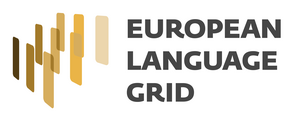With 24 official EU and many more additional languages, multilingualism in Europe and an inclusive Digital Single Market can only be enabled through Language Technologies (LTs). European LT business is dominated by thousands of SMEs and a few large players. Many are world-class, with technologies that outperform the global players. However, European LT business is also fragmented – by nation states, languages, verticals and sectors. Likewise, while much of European LT research is world-class, with results transferred into industry and commercial products, its full impact is held back by fragmentation. The key issue and challenge is the fragmentation of the European LT landscape. The European Language Grid (ELG) project will address this fragmentation by establishing the ELG as the primary platform for LT in Europe. The ELG will be a scalable cloud platform, providing, in an easy-to-integrate way, access to hundreds of commercial and non-commercial Language Technologies for all European languages, including running tools and services as well as data sets and resources. It will enable the commercial and non-commercial European LT community to deposit and upload their technologies and data sets into the ELG, to deploy them through the grid, and to connect with other resources. The ELG will boost the Multilingual Digital Single Market towards a thriving European LT community, creating new jobs and opportunities. Through open calls, up to 20 pilot projects will be financially supported to demonstrate the usefulness of the ELG. The proposal is rooted in the experience of a consortium with partners involved in all relevant initiatives. Based on these, 30+ national competence centres and the European LT Board will be set up for European coordination. The ELG will foster “language technologies for Europe built in Europe”, tailored to our languages and cultures and to our societal and economical demands, benefitting the European citizen, society, innovation and industry.
Partners
Deutsches Forschungszentrum für Künstliche Intelligenz GmbH (DFKI); Athena Research and Innovation Center in Information, Communication and Knowledge Technologies, Institute for Language and Speech Processing (ILSP); University of Sheffield (USFD); Charles University (CUNI); Evaluations and Language Resources Distribution Agency (ELDA); Tilde SIA (TILDE); Sail Labs Technology GmbH (SAIL); Expert System Iberia SL (EXPSYS); University of Edinburgh (UEDIN)


